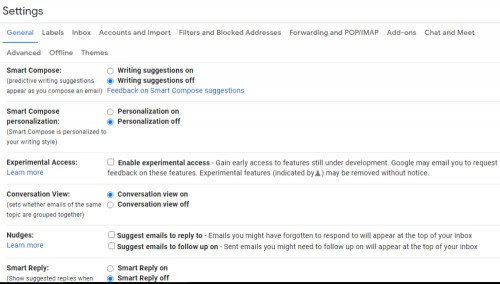How to Host Virtual Disney+ Viewing Parties With 'GroupWatch'
Disney+ just launched its GroupWatch feature for US customers, which lets up to seven people watch the same Disney+ show or movie together remotely an

Google collects data on everything you do while using its products and services. Sometimes this data is sold to advertisers; sometimes it’s used to make it easier to use Google’s products.
For example, Google uses data from Gmail, Chat, and Meet to make the entire Google user experience more convenient, like how it’ll learn how you type and suggest automated message replies that (hopefully) sound natural.
However, some people don’t want their data tracked and stored, period, no matter what conveniences it brings. While there are already ways to change Gmail’s data collection behavior—more on that in a second—it will soon be easier to opt-out out of Google’s tracking thanks to two new Gmail settings rolling out in the coming weeks.
First, users will now have the option to disable Gmail’s “Smart features” like Smart Compose, Smart Reply, and more. While these are handy, Google has to root through your Gmail, Meet, and Chat data for them to work.
The other setting lets users prevent Gmail, Chat, and Meet data from being used in other Google apps. Just like disabling smart features, turning off personalization removes certain conveniences like content suggestions in Google search, restaurant recommendations in Google Maps, or automated bill pay reminders from Google Assistant. You might lose a bit of helpfulness, but you’ll at least keep Google out of your inbox a bit more.
These new permissions will appear as automated prompts for all Gmail users in the coming weeks. That said, if you’d rather not wait, you can change (some) of your Gmail data preferences in Gmail’s settings right now. Pull up Gmail, and then visit Settings > General to turn off the following options:
Smart compose
Smart compose personalization
Nudges
Smart reply

Next, go to Settings > Inbox. Deselect all inbox categories and turn off “Importance Markers.”
You can change how your other Gmail data is used by going to Settings > Accounts and Import > Other Google Account settings.
Don’t worry if you didn’t know these features collect your data; it’s not mentioned anywhere in Gmail’s settings. Thankfully, the new user options are much clearer about how Smart features work and how Google uses the data it has collected.

Disney+ just launched its GroupWatch feature for US customers, which lets up to seven people watch the same Disney+ show or movie together remotely an

Amazon’s digital assistant can now control some of your smart devices for you—without any prompting needed. But before you start dreaming about a day

Slowly, but surely, every service we use is adding dark mode. This piecemeal rollout is frustrating for those of us who just want a darker version of

Netflix’s Android app will now automatically download shows and movies it thinks you’ll enjoy. It’s similar to the app’s Smart Downloads feature, whic

It’s Apple day! And just when I was starting to wonder if the world still had the capacity to get excited about hour-long product announcements. At it

The latest WhatsApp beta on Android brings some major changes to the way the app’s chat archive system works. The “new archive,” as the app calls it,

Spotlight Search is Mac’s built-in search feature. It shows up when you use the Command + Space keyboard shortcut, or when you click the Search icon i

Android 12, Google’s next big smartphone update, is focusing strongly on design. Chief among that focus is “Material You,” a new design language that
We are a comprehensive and trusted information platform dedicated to delivering high-quality content across a wide range of topics, including society, technology, business, health, culture, and entertainment.
From breaking news to in-depth reports, we adhere to the principles of accuracy and diverse perspectives, helping readers find clarity and reliability in today’s fast-paced information landscape.
Our goal is to be a dependable source of knowledge for every reader—making information not only accessible but truly trustworthy. Looking ahead, we will continue to enhance our content and services, connecting the world and delivering value.